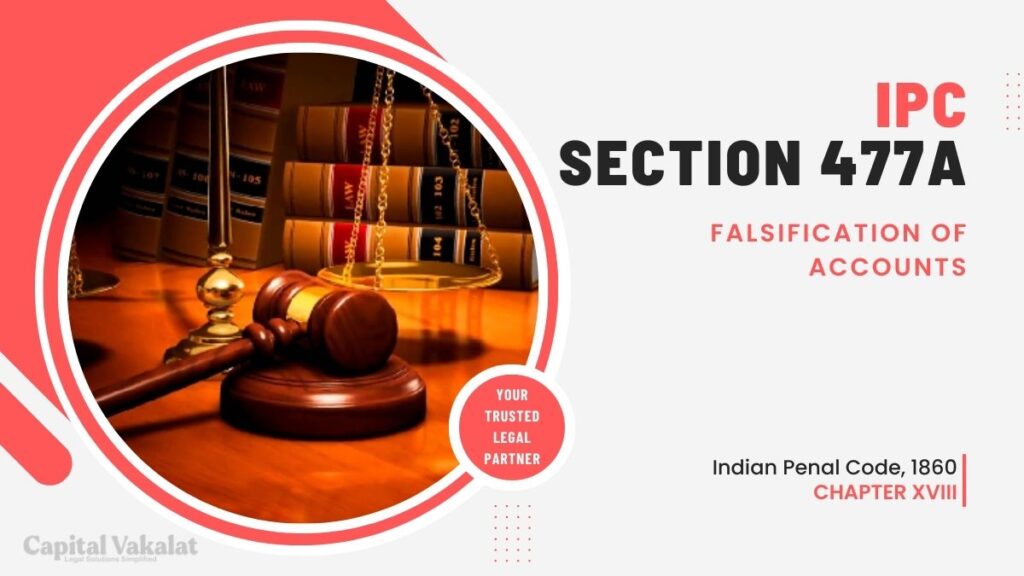In today’s complex business landscape, maintaining accurate financial records is paramount to ensure transparency and trust. One legal provision that addresses the issue of falsification of accounts is Section 477A of the Indian Penal Code (IPC).

Let’s delve into the intricacies of this section, exploring its definition, legal implications, real-world examples, preventive measures, challenges in prosecution, and its global significance.
Introduction to Section 477A IPC
In the realm of legal frameworks, Section 477A of the IPC stands as a safeguard against the manipulation and falsification of accounts. It recognizes the critical role that accurate financial reporting plays in the functioning of businesses and the overall economy. Essentially, this section targets individuals or entities involved in fraudulent practices that distort the true financial picture.
Understanding Falsification of Accounts
Falsification of accounts involves the intentional distortion or misrepresentation of financial information for personal gain. This can encompass various activities, including inflating revenues, understating expenses, or hiding liabilities. Understanding the different forms of fraudulent activities is crucial for identifying and curbing such practices effectively.
Legal Implications of Section 477A IPC
The legal consequences of violating Section 477A are severe, reflecting the gravity of financial misconduct. Individuals found guilty can face imprisonment and fines. Examining judicial precedents and case studies provides insights into how the legal system interprets and enforces this section, offering a perspective on the evolving nature of financial fraud prosecutions.
Real-world Examples of Falsification
To comprehend the impact of falsification of accounts, we can turn to real-world examples. Notable cases highlight the repercussions of such actions on businesses, stakeholders, and the broader economy. By analyzing these incidents, we can extract valuable lessons on preventing, detecting, and addressing accounting fraud.
Preventive Measures for Businesses
Proactive measures are essential to prevent falsification of accounts. Establishing robust internal controls and ensuring the independence of auditors are crucial steps. This section explores how businesses can fortify their financial reporting systems to minimize the risk of manipulation and fraud.
Challenges in Prosecuting Section 477A Cases
Despite the legal provisions, prosecuting cases under Section 477A poses challenges. Gathering concrete evidence and establishing the intent to falsify accounts can be intricate. Technological advancements and the prevalence of digital transactions add layers of complexity to investigating and proving financial misconduct.
Impact on Stakeholders
The repercussions of falsification extend beyond legal consequences. Investors, employees, and the economy at large bear the brunt of such fraudulent activities. Rebuilding trust becomes a formidable task once financial improprieties come to light. This section explores the ripple effects on various stakeholders.
Technological Solutions to Combat Falsification
As technology evolves, so do the tools available to combat accounting fraud. Blockchain technology and automation, for instance, offer promising avenues to enhance transparency and reduce the risk of manipulation. Understanding how these technologies function can empower businesses in their fight against falsification.
Global Perspectives on Accounting Fraud
A comparative analysis of Section 477A with international laws provides insights into how different jurisdictions approach the issue of falsification of accounts. Collaborative efforts and shared best practices on a global scale contribute to a more robust defense against financial fraud.
Conclusion
In conclusion, Section 477A of the IPC serves as a vital instrument in preserving the integrity of financial reporting. Businesses must recognize the importance of accurate accounts not only for legal compliance but also for sustaining trust. By implementing preventive measures, embracing technological solutions, and learning from past incidents, the business community can collectively foster a more transparent and resilient financial ecosystem.
Frequently Asked Questions
What are the legal consequences of violating Section 477A IPC?
Individuals found guilty can face imprisonment and fines, reflecting the severity of financial misconduct.
How does technology play a role in preventing accounting fraud?
Technologies like blockchain and automation offer ways to enhance transparency and reduce the risk of manipulation.
What challenges are involved in prosecuting Section 477A cases?
Gathering concrete evidence and establishing intent can be challenging, especially with the complexities introduced by digital transactions.
How does accounting fraud impact stakeholders other than businesses?
Investors, employees, and the broader economy may suffer the consequences, leading to a loss of trust that takes time to rebuild.